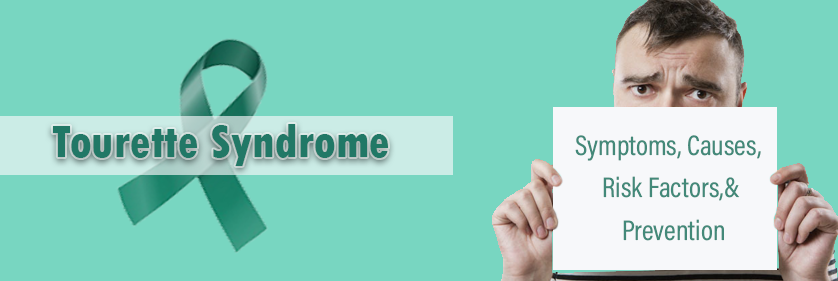Tourette syndrome (TS) is a neurological condition characterized by tics that are considered frequent, stereotyped, involuntary gestures, and vocalizations.
The early signs of Tourette syndrome (TS) are usually first observed in childhood, with an average onset between the ages of 3 and 9 age. TS occurs in people from all ethnic groups; males are affected about three to four times more often than females. It is estimated that 200,000 Americans have the most extreme type of TS, and as many as one in 100 have milder and less complicated symptoms such as a persistent motor or vocal tics. While TS can be a chronic disease with life-long symptoms, most people with the disorder experience their worst tic symptoms in their early teens, with improvement occurring in late teens and continuing into adulthood.
Symptoms
The main symptom of Tourette syndrome is tics. Tics are rapid movements or sounds that are repeated over and over without purpose. A person with a tic cannot control the movement or the ticking. Examples of common tics include:
- Throat Clearing
- Eye Blinking
- Sniffing
- Grunting
- Shoulder Shrugging
- Jumping
- Kicking
- Arm Jerking
When to seek medical attention?
Contact the doctor or paediatrician if there are more than a few weeks or months of involuntary gestures or sounds. Your doctor may refer you to a specialist if the tics are very frequent or severe, or if other emotional or behavioural problems are associated.
What causes Tourette syndrome?
Tourette is a highly complex syndrome. It involves abnormalities in various parts of your brain and the electrical circuits that connect them. An abnormality may exist in your basal ganglia, the part of your brain that contributes to controlling motor movements.
You can also involve chemicals in your brain which transmit nerve impulses. The chemicals are called neurotransmitters.
They include:
- Dopamine
- Serotonin
- Norepinephrine
At present, Tourette’s origin is unclear and there’s no way to avoid it. Researchers think the cause could be an inherited genetic disorder. We research to classify the particular genes which are specifically linked to Tourette.
Clusters in the family were established, however. Such clusters lead researchers to conclude that genetics play a role in many individuals who develop Tourette.
Risk Factors
Risk factors that could contribute to Tourette syndrome include:
Family History: People with a family history of Tourette syndrome or other tic disorders have an increased risk for Tourette syndrome.
Being Male: Males are more likely than females to develop Tourette syndrome.
Complications
Individuals with Tourette’s syndrome often lead to involved healthy lives. Yet Tourette syndrome also entails behavioural and social problems that can harm your self-image.
Conditions that also lead to Tourette syndrome include:
- Attention-deficit/hyperactivity disorder (ADHD)
- Obsessive-compulsive disorder (OCD)
- Autism spectrum disorder
- Learning disabilities
- Sleep disorders
- Depression
- Anxiety disorders
- Pain related to tics, especially headaches
- Anger-management problems
Prevention
Prevention is not understood. Perhaps the toughest part with Tourette’s living is coping with the humiliation or annoyance of getting tics that you cannot manage. While you seek treatment from your doctor, you can do a few other things to make yourself feel better:
Get support: Your family, friends, health care team, or a support group can help you meet the challenges of Tourette’s.
Stay active: Play sports, paint, or volunteer. These activities will take your mind off your symptoms.
Relax: Read a book, listen to music, meditate, or do yoga. Low-key activities you enjoy can combat the stress that can lead to tics.
Educate yourself: Learn everything you can about your condition so you’ll know what to do when you have symptoms.

Leave a Reply
You must be logged in to post a comment.